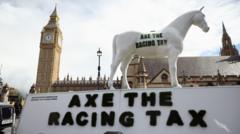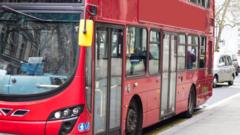Why Is British Horse Racing Protesting in Westminster?

Published: 2025-09-10 16:32:07 | Category: sport
The British horse racing industry is currently embroiled in a significant protest against the government's proposed tax increase on betting, which industry leaders warn could lead to devastating financial repercussions. The protest, marked by the participation of prominent jockeys and trainers, aims to lobby MPs to reconsider the proposed changes that the British Horseracing Authority (BHA) argues would threaten jobs and revenue vital to the sport's future.
Last updated: 27 October 2023 (BST)
Key Takeaways from the Protest
- Leading jockeys, trainers, and owners protested against a proposed tax rise on betting.
- The British Horseracing Authority predicts a £330 million loss in revenue.
- Over 2,700 jobs are at risk if the tax changes proceed.
- The protest coincided with a one-day strike, the first in modern racing history.
- A statue with the slogan 'Axe The Racing Tax' was featured at the protest.
Understanding the Proposed Tax Changes
The Treasury's proposal involves consolidating the existing tax structure for remote gambling, increasing the tax rate on bookmakers from 15% to 21%, which aligns it with online gambling. This shift, according to the BHA, could have a catastrophic impact on the horse racing industry, which has traditionally been treated differently from other forms of gambling due to its unique economic contributions.
The Financial Impact of the Tax Proposal
Financial analyses conducted by the BHA estimate that the proposed tax changes could result in a staggering £330 million drop in revenue within the first year of implementation. This loss is attributed to the reduced profitability of bookmakers who would face increased taxation, ultimately leading to a decrease in funding for racing operations and associated activities.
Job Losses and Economic Consequences
The potential job losses are equally alarming, with estimates suggesting that 2,752 positions could be at risk. These jobs span various roles within the industry, from trainers and jockeys to support staff at racecourses. Louise Norman, the chief executive of the Racehorse Owners Association (ROA), emphasised the broader economic impact of these job losses, stating that the racing industry is not merely a form of entertainment but a vital economic engine for many communities.
The Historical Context of the Strike
This protest marks a pivotal moment in British horse racing, being the first time in its modern history that the sport has voluntarily refused to race. The demonstration took place amidst a one-day strike, affecting four scheduled meetings at Lingfield Park, Carlisle, Uttoxeter, and Kempton Park. The BHA took the unprecedented step of rescheduling these events to stand in solidarity with the protestors.
Who Participated in the Protest?
Prominent jockeys including Hollie Doyle, Tom Marquand, and Oisin Murphy led the protest, joined by notable figures such as Paul O'Brien, Saffie Osborne, Kieran Shoemark, Lilly Pinchin, and former rider Richard Johnson. The group donned silks emblazoned with the phrase 'Axe The Racing Tax', signalling a unified stance against the proposed changes. A statue of a horse with the same slogan further emphasised the industry's resolve.
The Viewpoint of the BHA
The BHA has consistently argued that the unique nature of horse racing warrants special consideration in tax policy. The organisation believes that equating betting on horse racing with online gambling overlooks the distinct economic contributions of the racing sector. Norman highlighted that the sport involves significant emotional and financial investment from various stakeholders, including trainers, owners, and jockeys, and any adverse tax changes could undermine these contributions.
The Broader Implications for the Industry
The potential tax increase not only threatens the livelihoods of those directly involved in the sport but also poses risks to the broader economic landscape surrounding horse racing. This includes relationships with local communities, businesses that rely on racing events, and the overall health of the UK’s sports sector. If left unchecked, these changes could lead to a decline in attendance at racing events, further compounding the financial challenges faced by the industry.
The St Leger Festival and Its Significance
The timing of the protest is particularly poignant, as it coincides with the St Leger festival at Doncaster Racecourse, one of the most prestigious events in the British racing calendar. The festival not only attracts significant public interest but also generates substantial economic activity for the region. The one-day strike, therefore, serves as a powerful statement from the racing community, aiming to draw attention to the critical issues at stake.
What Happens Next?
As the British horse racing industry awaits a response from the government, the outcome of this protest may set a precedent for how the sport is treated in the future. Industry leaders are hopeful that their unified front will prompt MPs to reconsider the proposed tax changes. However, if the government proceeds with its plans, the consequences could be felt far beyond the racetracks, affecting thousands of livelihoods across the country.
Conclusion: A Call to Action for the Racing Community
The ongoing protest against the proposed tax rise on betting highlights the fragility of the British horse racing industry. It is essential for all stakeholders, including fans and local communities, to rally behind the cause to protect this cherished sport. The outcome of this situation will undoubtedly shape the future of horse racing in the UK, making collective action more vital than ever.
#HorseRacing #TaxProtest #AxeTheRacingTax
FAQs
What is the proposed tax change for horse racing betting?
The proposed tax change aims to increase the tax rate on bookmakers from 15% to 21%, aligning it with online gambling rates. The British Horseracing Authority warns this could severely impact the industry.
Why are jockeys protesting against the tax rise?
Jockeys are protesting because the tax rise could lead to significant revenue losses and job cuts within the horse racing industry, threatening its economic viability and future.
What is the financial impact predicted by the British Horseracing Authority?
The BHA predicts a £330 million loss in revenue and approximately 2,752 job losses within the first year if the proposed tax changes are implemented.
What is the significance of the St Leger festival?
The St Leger festival is one of the most prestigious events in British horse racing, attracting large audiences and generating considerable economic activity for the local community. Its timing adds urgency to the protest.
What actions have been taken by the British Horseracing Authority?
The BHA has rescheduled meetings and supported the strike, marking a historic moment in the sport’s modern history. They are advocating against the proposed tax changes to ensure the industry's survival.



